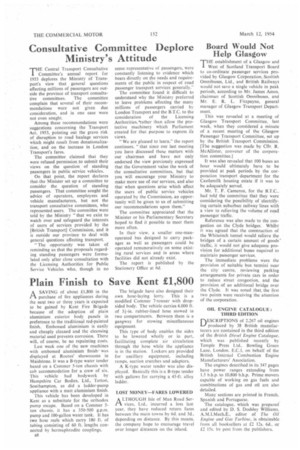Board Would Not Help Glasgow
Page 42

If you've noticed an error in this article please click here to report it so we can fix it.
THE establishment of a Glasgow and West of Scotland Transport Board to co-ordinate passenger services provided by Glasgow Corporation, Scottish Omnibuses, Ltd., and British Railways would not save a single vehicle in peak periods, according to Mr. James Amos, chairman of Scottish Omnibuses, and Mr. E. R. L. Fitzpayne, general manager of Glasgow Transport Department.
This was revealed at a meeting of Glasgow Transport Committee, last week, when they considered a minute of a recent meeting of the Glasgow Passenger Transport Committee, set up by the British Transport Commission. [The suggestion was made by Cllr. R. McAllister, convener of the corporation committee.] It was also revealed that 100 buses an hour would ultimately have to be provided at peak periods by the corporation transport department for the Castlemilk housing estate if it was to be adequately served, Mr. T. F. Cameron, for the B.T.C.. had told the committee that they were considering the possibility of electrifying certain suburban railway lines with a view to relieving the volume of road passenger traffic.
Reference was also made to the congestion on the Clyde bridges. WhilF.t it was agreed that the construction of the Whiteinch tunnel would relieve the bridges of a certain amount of goods' traffic, it would not give adequate provision for additional buses required to maintain passenger services.
The immediate problems were the provision of suitable bus termini near the citi centre, reviewing parking arrangements for private cars in order to reduce street congestion, and the provision of an additional bridge over the Clyde. It was noted that, the first two points were receiving the attention of the corporation.
OIL ENGINE CATALOGUE: THIRD EDITION
nESCRIPTIONS of 2,267 oil engines
produced by 38 British manufacturers are contained in the third edition of the British Diesel Engine Catalogue, which was published recently by Temple Press Ltd., Bowling Green Lane. London, E.C.I, on behalf of the British Internal Combustion Engine Manufacturers Association.
The engines described in its 347 pages have power ranges extending from 1.5 h.h.p. to 10,800 b.h.p. Prime movers capable of working on gas fuels and combinations of gas and oil are also detailed.
Many sections are printed in French, Spanish and Portuguese.
The catalogue, which was prepared and edited by D. S. Dodsley Williams, A.M.I.Mech.E., editor of The Oil Engine and Gas Turbine, is obtainable from all booksellers at £2 12s. 6d.. or £2 15s. by post from the publishers.




































































































